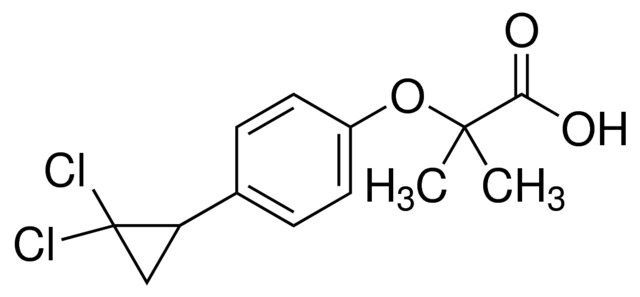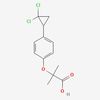Ciprofibrate
Safety Information
Hazard Statements
Precautionary Statements
Pictograms
Properties
| Signal Word | Danger |
Product Description
Ciprofibrate is a fibrate medication primarily used to treat hyperlipidemia, a condition characterized by elevated levels of lipids in the blood. Fibrates work by reducing the production of very-low-density lipoprotein (VLDL) triglycerides in the liver, thereby lowering the overall cholesterol level. Ciprofibrate is particularly effective in managing hypertriglyceridemia, a type of hyperlipidemia where triglyceride levels are excessively high. Its mechanism of action involves activating peroxisome proliferator-activated receptor alpha (PPARα), a nuclear receptor that regulates lipid metabolism.
Application
In clinical practice, ciprofibrate is prescribed to patients with hyperlipidemia, especially those with high triglyceride levels. It is often used in combination with lifestyle modifications, such as diet and exercise, to manage lipid profiles and reduce the risk of cardiovascular diseases. While effective in lowering triglyceride levels, ciprofibrate may not be suitable for all patients due to potential side effects, including gastrointestinal issues and liver function abnormalities. Therefore, its use requires careful consideration based on individual patient profiles and medical history.
Articles:
- Accessing elusive σ-type cyclopropenium cation equivalents through redox gold catalysis
Publication Date: 23 May 2024
Xiangdong Li, Matthew D. Wodrich & Jérôme Waser
https://doi.org/10.1038/s41557-024-01535-8
- Ciprofibrate Therapy Improves Endothelial Function and Reduces Postprandial Lipemia and Oxidative Stress in Type 2 Diabetes Mellitus
Publication Date: 18 April 2000
Marc Evans, Richard A. Anderson, John Graham, Gethin R. Ellis, Keith Morris, Stephen Davies, Simon K. Jackson, Malcolm J. Lewis, Michael P. Frenneaux and Alan Rees
https://doi.org/10.1161/01.CIR.101.15.1773
- Effect of Ciprofibrate on Lipoproteins, Fibrinogen, Renal Function, and Hepatic Enzymes
Publication Date: December 2002
Evangelos Rizos, Eleni Bairaktari, Emmanouel Ganotakis, Vasilios Tsimihodimos, Dimitri P. Mikhailidis and Moses Elisaf

